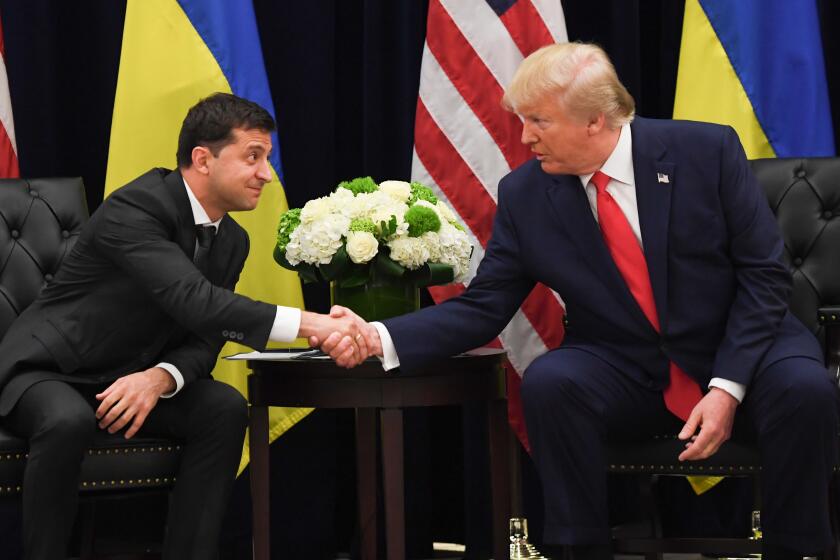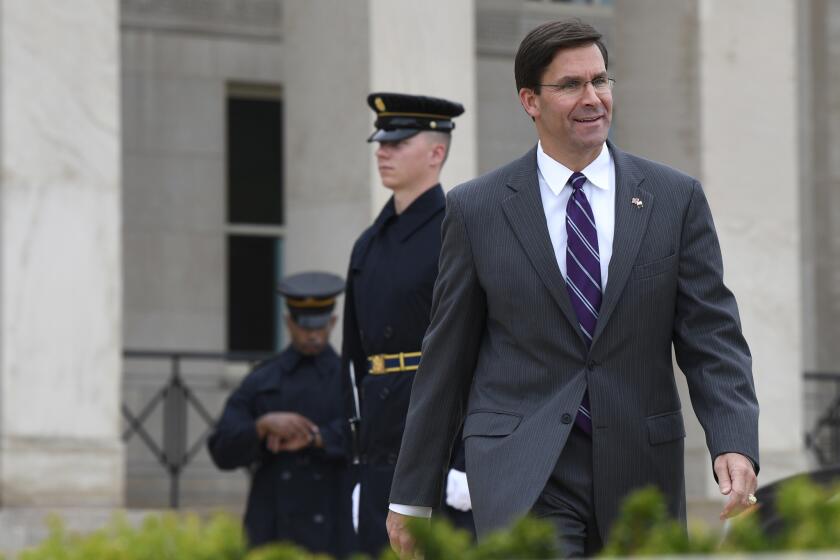A defiant White House says it won’t participate in ‘unconstitutional’ impeachment inquiry

- Share via
WASHINGTON — In a stunning show of defiance, the White House said Tuesday it would refuse to participate in the House impeachment inquiry, setting up a direct constitutional clash between the two co-equal branches of government that could send a momentous legal battle to the Supreme Court.
The strongly-worded eight-page letter, sent to House Speaker Nancy Pelosi (D-San Francisco) and three committee chairmen, marks a major milestone in the impeachment drama, and came hours after the White House directly intervened to block a U.S. diplomat involved in the scandal from giving a voluntary deposition.
While Trump has offered a shifting series of defenses, the White House letter, signed by Pat A. Cipollone, counsel to the president, rolled them into a blistering critique of the integrity and motivation of Democrats as they examine whether Trump abused his power when he blocked U.S. military aid to Ukraine and then asked its president to investigate one of Trump’s political rivals.
Rejecting what he called “your baseless unconstitutional efforts to overturn the democratic process,” Cipollone said Trump and his administration “cannot participate in your partisan and unconstitutional inquiry under these circumstances.”
“Given that your inquiry lacks any legitimate constitutional foundation, any pretense of fairness, or even the most elementary due process protections, the executive branch cannot be expected to participate in it,” he wrote.
Cipollone accused Pelosi of violating “fundamental fairness and constitutionally mandated due process,” saying Trump should be allowed to cross-examine witnesses, receive transcripts of the testimony, have access to evidence the House collects and have counsel present during questioning.
“Your highly partisan and unconstitutional effort threatens grave and lasting damage to our democratic institutions, to our system of free elections, and to the American people,” he wrote.
Cipollone slammed the inquiry as an attempt to “overturn the results” of the 2016 presidential election and to influence the upcoming 2020 campaign.
The letter was sent to Pelosi and the Democratic chairmen of the House Intelligence, Foreign Affairs and Oversight committees who have spearheaded the impeachment proceedings that began last month.
Rep. Adam B. Schiff (D-Burbank), who heads the Intelligence Committee, tweeted that the White House was arguing that Trump was above the law.
“The White House says there is nothing wrong with pressuring a foreign government to intervene in a U.S. election. They say: they will not cooperate with an impeachment inquiry unless it’s on their terms. They mean: the president is above the law. The Constitution says otherwise,” he wrote.
In a statement, Pelosi said: “The White House should be warned that continued efforts to hide the truth of the president’s abuse of power from the American people will be regarded as further evidence of obstruction. Mr. President, you are not above the law. You will be held accountable.”
Although the White House declassified a memorandum of a July 25 phone call between Trump and the president of Ukraine, a key communication in the impeachment case, it has refused to cooperate on other issues, spurring House subpoenas to the White House, to Secretary of State Michael R. Pompeo and to other officials for documents or testimony.
If the White House doesn’t comply with the House subpoenas and investigation, the dispute is “going to go to the Supreme Court,” said Elaine Kamarck, a fellow in governance studies at the nonpartisan Brookings Institution, and it will be difficult for the executive branch to argue Congress doesn’t have the power to subpoena the White House as part of its oversight and impeachment powers.
A senior administration official denied the decision to defy subpoenas and other House demands would fuel an additional charge of obstruction if articles of impeachment are drawn, as some Democrats have threatened.
“Asserting rights under the Constitution cannot ever properly be framed as obstruction of justice,” the official told reporters in a background call. “That’s a political argument. It’s not a legal argument.”
But the official, who spoke on condition of anonymity, refused to say what changes in procedure would prompt Trump to cooperate with the investigation, nor would the White House promise to cooperate in the event the House held an impeachment vote, as is demanded in the letter.
“We don’t want to speculate about hypotheticals or draw red lines or predict the future,” the official said, asserting that the letter to Congress outlined the full list of flaws with the Democratic-led investigation.
Aides have learned not to promise any action on behalf of Trump until and unless the president weighs in personally. And he has shown repeatedly that he prefers to fight perceived attacks rather than apologize or acquiesce to demands, even those that experts say are legally required.
Though some White House advisors insist the impeachment proceedings are a political winner for Trump, several people close to the president say he is furious at the inquiry.
Trump and many of his allies believe that meeting accusations with an aggressive counter-attack was effective in his darkest days in politics, including the release of the “Access Hollywood” tape during the campaign and the later accusations of misconduct against his Supreme Court nominee, Brett M. Kavanaugh.
Cipollone’s letter, though couched in legal argument, bears more than a hint of that combative language.
“The president cannot allow your constitutionally illegitimate proceedings to distract him and those in the executive branch from their work on behalf of the American people,” it reads. “The president has a country to lead.”
House Democrats separately issued a subpoena late Tuesday to Gordon Sondland, U.S. ambassador to the European Union, to force him to testify and turn over documents and text messages, apparently from a private device, regarding the president’s dealings with Ukraine.
The subpoena orders him to submit documents by Oct. 14 and testify on Oct. 16.
“The failure to produce this witness, the failure to produce these documents, we consider yet additional strong evidence of obstruction of the constitutional functions of Congress,” Schiff said.
In a tweet, Trump said Sondland would not appear because “unfortunately he would be testifying before a totally compromised kangaroo court, where Republican’s rights have been taken away.”
Sondland, a key player in the unfolding impeachment scandal, was scheduled to answer questions Tuesday from the three House committees but pulled out at the last minute after the State Department directed him not to cooperate.
Marie Yovanovitch, who was recalled in May as U.S. ambassador to Ukraine, is still scheduled to appear behind closed doors on Thursday but may run into the same State Department restrictions as Sondland.
Robert Luskin, Sondland’s lawyer, said in a statement that the State Department had directed his client not to appear and “as the sitting U.S. ambassador to the EU and employee of the State Department, Ambassador Sondland is required to follow the department’s direction.”
Sondland had agreed to appear voluntarily “to answer the committee’s questions on an expedited basis,” the lawyer said. “He stands ready to testify on short notice, whenever he is permitted to appear.”
Sondland, a wealthy hotelier before joining the Trump administration, exchanged numerous text messages with other U.S. diplomats between July and September. The phone texts are under scrutiny by House Democrats looking into Trump’s efforts to get Ukraine to help his reelection campaign by digging up dirt on former Vice President Joe Biden.
The texts were given to the committees by Kurt Volker, who stepped down as special envoy to Ukraine days after the impeachment inquiry began last month. He testified behind closed doors for 10 hours last week.
Rep. Jim Jordan (R-Ohio), the ranking Republican on the House Oversight Committee, said the State Department blocked Sondland from testifying because a transcript of Volker’s testimony was not made public, and only some of the 67 pages of text messages that Volker provided the committee were released.
“We wish [Sondland] would have been able to testify too, but we fully understand why the administration made the decision they did,” Jordan said. “It’s based on the unfair and partisan process that Mr. Schiff has been running.”
Here’s a look at some of the events that led up to House Democrats’ impeachment inquiry and what has happened since the formal announcement.
In the text messages, Sondland encouraged a senior aide to Ukraine’s president, Volodymyr Zelensky, to conduct the probes that Trump wanted — into Biden and into any Ukrainian assistance to Democrats in the 2016 election — in exchange for a visit to the White House.
No evidence of any wrongdoing by Biden or his son, or of any Ukrainian interference in the 2016 race, has emerged.
Times staff writer Jennifer Haberkorn in Washington contributed to this report.
House Democrats issue subpoenas to Defense Secretary Mark Esper, acting White House budget director Russell Vought as part of Trump impeachment inquiry.
More to Read
Get the L.A. Times Politics newsletter
Deeply reported insights into legislation, politics and policy from Sacramento, Washington and beyond. In your inbox twice per week.
You may occasionally receive promotional content from the Los Angeles Times.















